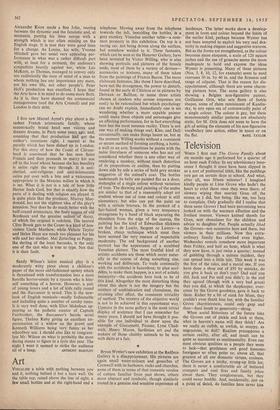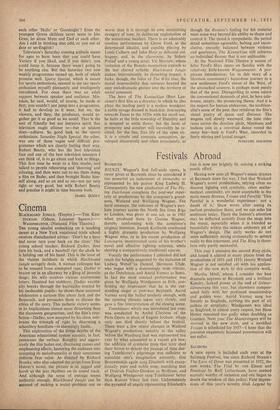Television
WHEN I first met The Grove Family about six months ago it performed for a quarter of an hour each Friday. In my televisionary inno- cence I thought it must have been slipped in as a sort of penitential titbit, like the puddings you got on certain days at school. And what, after all, was fifteen minutes? I imagined kindly people at Lime Grove who hadn't the heart to evict them once they were there; of ,viewers wiping that saurian Gran off, the screen as I did, but being, like me, too lazy to complain. Only gradually did I realise that these same Groves I had been patronising were looked on with the warmest affection and the liveliest interest. Viewers knitted shawls for Gran, sent chocolates for the children and advice to daughter Pat. People actually liked the Groves—not eccentrics here and there, but viewers in their millions. Now this extra- ordinary family has climbed even higher. Wednesday sounds somehow more important than Friday, and half an hour, which is what they now have, is just twice a quarter; instead of gabbling through a minute incident, they can spread into a little tale. This week it was the first of the tales, and a moral one. If you have done a shop out of £95 by mistake, do you give it back or don't you? Dad said you did, Jack and Pat said you didn't; in the end they agreed (though with a very bad grace) that you did, at which the shopkeeper, over- come by the Grove goodness, gave it back to them. Richer by a bit of mink for Mum, they couldn't even thank him but, with the familiar Grove charmlcssness, could only gasp and then—final insult to generosity—shrug.
When social historians of the future take the Groves out of pickle and look at them, what in heaven's name will they think? Are we really as oafish, as owlish, as snappy, as ungracious, as dull? Realism presupposes a certain reality, after all, and insult can be quite as inaccurate as sentimentality. Even our most obvious qualities as a people they seem to lack—that gentleness and good humour. foreigners so often point to; above all, that greatest of all our domestic virtues, cosiness. The Groves are a tetchy, strung-up little lot; there is never a comfortable air of buttered crumpets and coal fires and family jokes about them. They conglomerate, but they could never huddle. And, incidentally, just on a point of detail, do families here never kiss each other 'Hallo' or 'Goodnight'? Even the youngest Grove children never seem to kiss Gran, let alone Mum and Dad or each other. Am I odd in thinking that odd, or just out of date or un-English?
Television's Saturday evening attitude seems for ages to have been that you could have Variety if you liked, and if you didn't. you could lump it, because there wasn't going to be anything else. But this Saturday two new weekly programmes turned up, both of which promise well. Sports Special, which is meant for sports enthusiasts, seemed to me (no sports enthusiast myself) pleasantly and intelligently introduced. For once there was an adult rapport between speaker and audience. Mis- takes, he said, would, of course, be made at first; you couldn't just jump into a programme, it had to develop as it went; but we, the viewers, and they, the producers, would to- gether get it as good as we could. That is the sort of friendly but not intrusive spirit that television ought oftener to—but so seldom does—achieve. So good luck to the sports enthusiasts. Saturday Night Special, the other, was one of those vague and difficult pro- grammes which are clearly feeling their way. Robert Beatty, who has the best television face and one of the best television manners I can think of, is to go about and look at things. This first time he went to a film studio, and talked to people rehearsing and 'shooting' and relaxing, and then went out to see them doing a film on Bader, and then brought Bader him- self along, and so on and so on—not yet very tight or very good, but with Robert Beatty and practice it might in time become both.
ISABEL QUIGLY



































 Previous page
Previous page